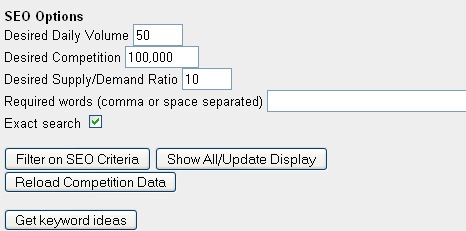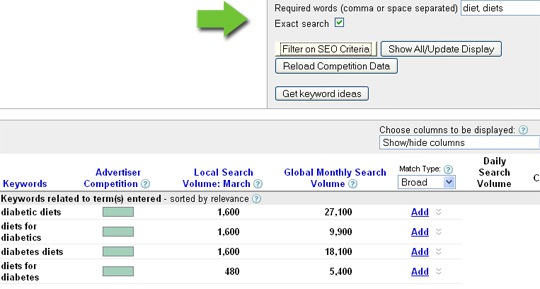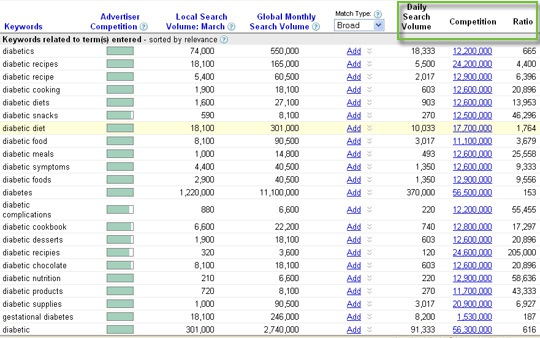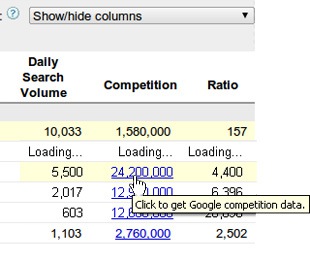Grow your business with TopRank Online Marketing tips, articles, & experts interviews on social media, digital PR & search engine marketing. I am Certified Google Adwords Qualified Individual and brings a high level of Search Engine Marketing Expertise. I have extensive experience working with Google SEO & Adwords pay per click accounts.
Tuesday, May 4, 2010
55 Quick Search Engine Optimization Tips
Monday, May 3, 2010
Enhance Google Adwords Tool with Keyword Tool Supercharger
Keyword Tool Supercharger is a great tool developed by GeekLad. It means to provide more competition and keyword analysis data for a widely-used free keyword research tool – Google Adwords Tool.
It can be installed as Google Chrome Extension or as a browser bookmarklet –KWT Supercharger (FireFox: just drag it to your browser bookmarks toolbar).
Now give it a try!
Run a keyword suggestions search at Google Adwords Tool and click the bookmarklet. The first thing you’ll notice is an extra options box added to the regular Adwords tool interface.
The box contains the following options:

The box allows to filter the search terms in various ways you may (and will!) find useful:
- Desired Daily Volume: The number of daily searches for the keywords. Higher is better.
- Desired Competition: The number of websites containing the keywords. Lower is better.
- Desired Supply/Demand Ratio: The # of competing sites/# of daily searches. Lower is better, a ratio less than 1 is ideal.
- Required words (comma or space separated): Words/phrases you wish to see appear within the results. These need to be separated by commas. You can also prefix a word/phrase with a minus (-) to specify words you do not want to appear in the results.
- Exact search: Whether or not you want the competition data to be based on searches of the exact phrase (the keyword phrases are searched with quotes). By default, this is enabled.
- Filter on SEO Criteria: When you click this, only rows that match the criteria above will be displayed.
- Show All/Update Display: This will display all results (including those that do not match the criteria above).
- Reload Competition Data: This will reset and reload all of the competition data. This may be necessary if you’ve selected a new choice for the Exact search option.
While this all seems pretty straightforward, let’s look into some of the options in more detail:
Search within your keyword list
Or, in other words, filter your keyword list by one (or more) term you want to see in the key phrase.
For example, first run the keyword search for [diabetic] and then filter the list by two words [diet] and [diets]. You thus see a clean keyword list containing your core term [diabetic] and the extra word you are currently interested in [diet(s)]:

Get an idea of the “supply”
While the “search volume” data gives you an idea of each key term “demand”, the tool offers a way to research the supply: by default, it uses Bing API to check how many search results each term will generate if you search Bing for the exact match. Bing data may seem not exactly reliable but it can be used to compare.
The tool also breaks down monthly searches by average daily search, and then builds a supply/demand ratio based on the daily searches divided by the total number of results for the keyword:
Daily search volume / total number of search results = supply/demand ratio
(The lower the ratio, the better the odds you’ll receive some organic traffic if you use those keywords on your page.)
The additional keyword analysis data is provided in three new columns in the display:

You can also query Google search results numbers but, unlike with Bing, you won’t be able to do that in bulk. Instead, you’ll have to click each Bing number for the tool to query and return Google result number. The supply/demand ratio will also be re-calculated once you query Google:

A few things I’d like to be added to the tool:
- The sorting option for the added columns;
- The ability to enable competition query for the filtered-by-the-keyword list (currently, when I filter the list by a keyword and then push “Reload Competition Data”, the keyword filter seems to get disabled)
All in all, I found the tool very usable and useful. You may want to give it a try and let me know what you think!
From SEJ
Thursday, April 29, 2010
Google Starts Displaying Pages Similar to Search Results
Google has just launched a new search feature that aims to help you easily find new websites that are similar to the ones you are familiar with and are related to the subject that interest you, particularly for your current search session.
The new feature called “Pages similar ” makes the Google search feature “similar” more prominent and visible on your search results. You can find a box just below the search results page containing list of links that point to, well pages that are similar to the current search results that Google has yielded for your search terms.
The links listed on this Pages similar box are alternative sites that you won’t normally check they don’t directly answer your search query but then again the site may contain contents that would otherwise be useful to your current search.
Google gave the following example illustrating Google’s Pages Similar to feature.
For example, with the recent earthquakes around the world, many of us have been looking for international relief organizations. We knew that Direct Relief International has been actively involved in Haiti, so we started off by searching for [direct relief international]. The first result on the page linked us to the Direct Relief website, where we found many ways to help in Haiti. But what if one wants to support several organizations? If you click the “Similar” link that’s on the same line as the “www.directrelief.org/” URL, you’ll find other nonprofits that are also involved in relief efforts.
We’ve offered a “Similar” feature on results for a while now as a way to discover new, useful sites, but it hasn’t been too visible. Since we’ve been continuously improving this feature and we think it’s really useful, we’re now going to start showing these alternative sites more prominently. Starting this week, for queries where similar sites are likely to be helpful, we’ll display a list of “Pages similar” at the bottom of the results page. For example, this is the list of sites similar to Direct Relief International:
Wednesday, April 28, 2010
Search Engines and Optimization
Search engines, search engines, search engines….Who knows which one to optimize for? Why does everyone behave so silly when it comes to search engines and optimization for a particular engine or keyword even? As most know, Google is the flavour of the month. It appears that everyone is excited about it. What about the other engines? Did someone forget that they exist?
Because Google is the leading engine, this years “in engine” , word of mouth spreads, more people use it, website owners begin optimizing for it and SEO goes nuts. How easily we forget, that only a year or so ago, Yahoo was the leading search engine. Which one next I wonder?
I think it is quite humorous that people have become strung up about one particular engine and one method of advertisement because they do well for a short period. By a short period, I mean a year or two. This is short when your running a business over decades. Google changed their algorithm end 2003 and sent the world a shockwave. Someone forget to tell these many upset businesses and website do it yourselvers, that relying upon one method of advertisement is not good business practice. If that’s the extent of business knowledge , then some businesses are in lots of trouble.
Florida (Google HQ) decided to change their system. As a result, many website owners, who had paid thousands of dollars or suffered thousands of man hours building a website came unstuck. Why? Because all of their efforts were built around the characteristics of one system. Who did they blame? SEO’s, Experts, Copywriters, Link Building Companies, Google or anyone who would listen – often the media. Someone forgot to tell them that Google is a business, and if your manipulating a website within their search engine rankings, your messing with their business. Keeping this in perspective, only those negatively affected are crying to the press. Those businesses or individuals who gained rankings as a result of this change, strangely enough, don’t have anything negative to say.
I think the moral of the story is, people need to stop attempting to over optimize a website and never concentrate on only one source for rankings. Website owners need to focus on reality and market their websites across as many engines as possible. It is also necessary to keep a focus on what you are trying to achieve. Essentially, a website to attract visitors and stimulate their attention for your information and products.
